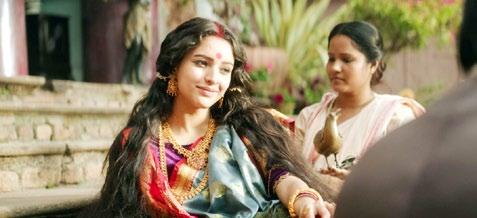
3 minute read
F RIGHT FABLE DOE S N’T QUITE HIT THE MARK
from 2020-07 Sydney
by Indian Link
BULBBUL (Netflix)
S TARRi NG: Tripti Dimri, Avinash Tiwary, Rahul Bose, Paoli Dam, Parambrata Chattopadhyay Di R eCTOR: AnvitaDutt
HHH
Why must women wear toe rings, little Bulbbul asks her aunt. “So that they can be kept under control,” the aunt replies. “What is control?” the girl whispers innocently, as the aunt carries Bulbbul in her arms to her wedding mandap, to be married off to a rich landlord, decades older.
The conversation does set the tone for a fascinating feminist allegory right at the start of this tale.
Bollywood lyricist-writer Anvita Dutt makes the season’s most exciting directorial debut with Bulbbul, a classic horror reorganised to make a solid statement about gender abuse. The setting is late 19th century Bengal, amid the lavish excesses of babu-dom. It is a world that has traditionally rendered rich aesthetics to the Bollywood screen - from every Devdas worth a recall and Sahib Biwi Aur Ghulam to Parineeta or Lootera. It is also a world of colourful, chauvinistic amorality, films and fiction of the past have often portrayed.

To that milieu, Dutt and her creative team add hues of horror, shifting the mood from sombre dark tones to the ominous glow of the blood moon that symbolises vengeful carnage unleashed by womanhood wronged.
The story starts off with child bride Bulbbul getting married to the rich zamindar Indranil (Rahul Bose), who is much older. Indranil’s mentally unstable twin brother Mahendra (Bose in double role) has a roving eye for the child bride, it becomes obvious right away. The only person Bulbbul can relate with at her in-laws’ place is Satya, Mahendra’s youngest brother who is just a few years older than her.
Fast forward 20 years, and Satya, a strapping young man (Avinash Tiwary), returns from London after studying law. Timid little Bulbbul has morphed into the assertive young mistress (Tripti Dimri) of their ancestral mansion. Satya hears strange tales, of men in the village being killed by a ‘chudail’ (demon woman), even as he starts falling for Bulbbul.
Anvita Dutt has set up a grand canvas for her fright fable, which unfolds as an interesting piece of cinema bearing varied artistic influences. The visual aspect is suitably mainstream in order to woo the new-age OTT crowd, bringing out resplendent medieval Bengal with the same assuredness as it uses VFX to create the paranormal terror. More impressive are the relationship nuances that remind you of Tagore in Chokher Bali or Nashtanirh (filmed by Satyajit Ray as Charulata).
Yet, the most interesting aspect of Bulbbul has to be the way in which Dutt has envisioned her ‘chudail’. The demon woman here is imagined as a superhero of sorts, defying traditional
Indian lore. She invokes terror in the heart of every man, even as tales of her twisted feet and the sinister forest where she lives abound. Yet, her brutal retribution is reserved only for the ones that have wronged women.
The triumph of this film lies in the idea it serves, provocative for the way it challenges societal norms as it sets up slow-burn tension, propped up by a cast that does its job sufficiently.
But Bulbbul is predictable, and for a horror film that is a downer. The narrative could have done with a few more smart spins as it moved ahead.
Vinayak Chakravorty
UNDeKHi (SonyLiV)
STARRiNG: Dibyendu Bhattacharya, Harsh Chhaya, Surya Sharma, Anchal Singh, Apeksha Porwal
DiReCTOR: Siddharth Sengupta
HHH
The crime drama must be among genres that have benefitted the most with the advent of OTT in India, what with filmmakers pushing the envelope as never before in terms of concepts and treatment. Undekhi does not explore any unusual crime. It is the execution of the plot over 10 episodes that makes for an engaging watch. Series creator Siddharth Sengupta was operating with very basic ingredients. A crime is committed in full view. The perpetrator gets away because he is a powerful man. There is a cop on the trail, and the victims are hapless underdogs. And good will always find a way to outwit evil.
Sengupta and his co-writers (Varun Badola, Umesh Padalkar and Mohinder Pratap Singh) give a brief backgrounder, opening their story in Bengal's Sunderbans area, with a gruesome murder. The victim is a police officer. The suspects, it emerges, could be a couple of tribal girls and the local DSP Barun Ghosh (Dibyendu Bhattacharya) is soon on their trail.
Meanwhile, the girls are in Manali. They are professional dancers who have travelled all the way to Himachal Pradesh to perform at a wedding of the super-rich and powerful. The groom's Papaji (Harsh Chhaya) in a fit of drunken excitement shoots one of the girls. The body is disposed of by Papaji's foster son Rinku (Surya Sharma), also a local goon of sorts. Suddenly the other girl finds herself in peril. On the run from the murderous clan, the girl (Apeksha Porwal) is also being hunted by DSP Ghosh, who is adamant to take her back alive to Bengal, where the cop killing took place.
The screenplay sets up that premise crisply and early, leaving most of nine episodes to explore how the suspense pans out. Creator Sengupta and series director Ashish R. Shukla maintain an undercurrent sense of unease as the story builds up. The treatment works well, rendering an ominous appeal to the gorgeous Manali locales.
The series derives much of its intrigue from the contrast between Dibyendu Bhattacharya's DSP Barun Ghosh and Surya Sharma's Rinku. They define two faces of law and lawlessness, and also strike up very contrasting portraits of men whose lives are dictated by crime.










